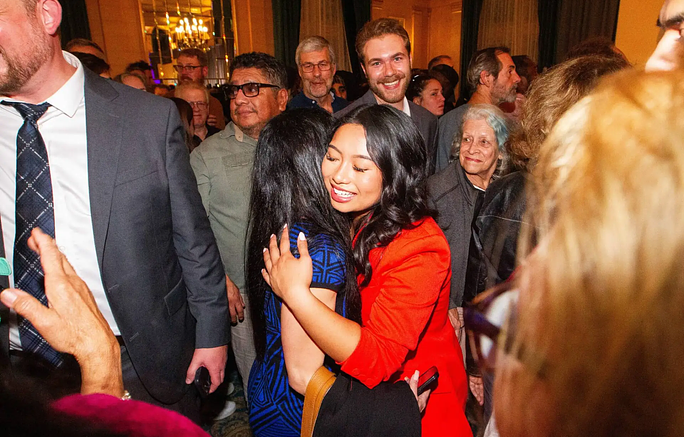Jelynn Dela Cruz, born and raised in Winnipeg’s Radisson riding, is 23 years old. When Ed Schreyer was elected as the youngest MLA in Manitoba’s history, he was 22.
Last Tuesday, Dela Cruz, a former UMSU president, was elected MLA for Radisson, becoming the second youngest MLA in Manitoba’s history and the youngest woman ever elected to the legislature in the province.
Last Tuesday’s race saw Manitoba New Democratic Party (NDP) candidate Dela Cruz defeat two-term Manitoba Progressive Conservative (PC) incumbent and Minister of Consumer Protection and Government Services James Teitsma by a margin of over 1,100 votes. Dela Cruz rode an orange wave that ousted the PCs and handed the NDP a majority government.
Dela Cruz called it “humbling in a way” to be one of the youngest people ever elected in Manitoba politics, and said she hopes someone breaks her record in future.
“I am just honoured to be the person at the table when it comes to discussing solutions for a lot of the challenges that us youth have inherited,” she said.
Student politics and provincial advocacy went hand-in-hand for Dela Cruz. She got involved amid protests against Bill 31 — a piece of PC government legislation that lifted a cap on tuition increases. She said she attended a Canadian Federation of Students rally weeks before she began her first class at university.
“For me it was outrageous that so many sweeping changes were being made to post- secondary after we’d just seen those same changes be proposed to health care,” she explained.
“It kind of set the tone for what was to come in the future years of the Conservative government that we managed to defeat in this election.”
Dela Cruz believes her time at UMSU helped her become familiar with the various political entities working in Manitoba and the process of lobbying and policy research.
During her time with the student union, she helped found the Manitoba Alliance of Post-Secondary Students, a provincial student advocacy group that represents more than 72,000 students, alongside former UMSU vice-president advocacy Kristin Smith.
“I think that really provided a taste of what it would be like in the legislature and speaking to even larger widespread policy,” she said.
She also highlighted the opportunities she had as UMSU president “to sit across the table — of course, over Zoom for the most part” from government ministers and opposition representatives with viewpoints across the political spectrum.
Dela Cruz also served on the U of M board of governors and senate, along with the university’s Equity, Diversity and Inclusion Task Force and COVID-19 Steering Committee.
After UMSU, she also worked for L’Arche Winnipeg, a charitable organization that provides supports such as job training for people with intellectual disabilities.
Dela Cruz said one common trend she has encountered throughout her involvement in politics “is that a lot of folks around our age are unfortunately apathetic.”
“Meanwhile, there’s a whole lot of good that we can do together when we speak up for the things that concern us and the things that we’re passionate about,” she said.
“The youth as a whole have the potential to shape our future, not tomorrow, but today, and it’s a matter of motivating each other and bringing as many of our friends along for the ride as possible.”
Dela Cruz noted that student and provincial politics deal with many of the same issues, such as the rising cost of living and access to health care.
“Many international students to this day don’t have access to the public health-care system and that’s something that the NDP has vowed to bring back,” she said.
The PC government repealed legislation that granted international students free access to universal health care in 2018.
Dela Cruz said young people hoping to get involved in politics should consider what impacts them personally, as well as their communities and the rest of society, and should think about how these issues are interrelated.
“Us university students, we are a good example of people that need support in this community or in this province, and there’s a lot of inspiration and a lot of emotion that can be channelled for change through our own personal experiences.”





